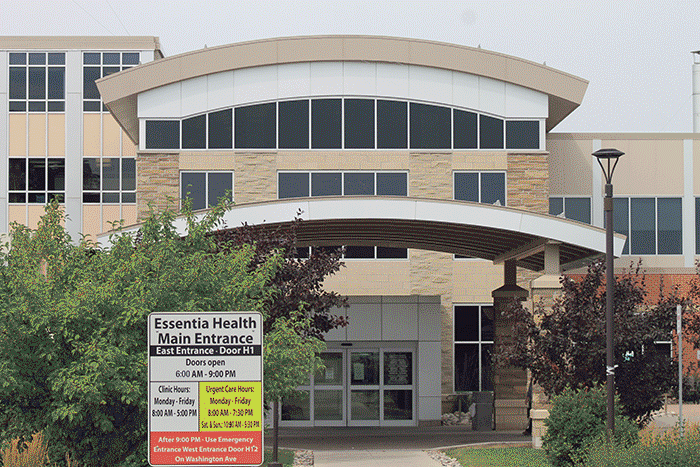Essentia Health is ready for COVID-19 booster shots
News | Published on September 30, 2021 at 11:12am EDT | Author: Chad Koenen
0
Essentia Health is offering booster shots for those that received the Pfizer vaccine to those that qualify.
Booster is authorized for specific populations
The Centers for Disease Control and Prevention on Thursday authorized booster shots of the Pfizer vaccine for specific populations.
Those now eligible for a booster include: people aged 65 and older and residents of long-term-care facilities; people aged 50-64 with underlying medical conditions that make them especially susceptible to severe COVID-19; people aged 18-49 with specific medical conditions, based on an assessment of their individual benefits and risks; and people in the 18-64 age group who are at increased risk for COVID-19 exposure and transmission based on their occupational or institutional settings.
On Wednesday, the United States Food and Drug Administration amended its emergency use authorization for the Pfizer vaccine, allowing for a single booster dose to be administered at least six months after completion of the initial series.
At Essentia Health, planning for this next phase began weeks ago. In accordance with guidance from the FDA and CDC, members of the specified populations who are at least six months removed from their second dose of the Pfizer vaccine can receive a booster.
Separate from the booster approval, the FDA and CDC previously had approved a third dose of mRNA vaccine — Pfizer or Moderna — for moderately to severely immunocompromised people as soon as 28 days after their second shot.
All those ages 12 and up are eligible for vaccination against COVID. The Pfizer/BioNTech vaccine — now known as Comirnaty — in August received full approval from the FDA for those 16 and up; it remains available under emergency use authorization for patients 12-15.
By Wednesday, Sept. 29, Essentia patients and non-patients alike in these additional groups can schedule a vaccine appointment via our MyChart patient portal. You also can call (833) 494-0836 to schedule a vaccine appointment. Additionally, Essentia Health pharmacies will offer vaccination opportunities.
Because of the highly contagious delta variant, vaccination is more important than ever. It remains the best and safest method for preventing COVID and its transmission. The overwhelming majority of patients hospitalized with COVID nationwide are unvaccinated.
“Getting fully vaccinated and following FDA and CDC guidelines for boosters remains the most effective means for preventing hospitalization for COVID-19,” said Dr. Peter Henry, chief medical officer at Essentia. “Most hospitalizations for COVID-19 are in unvaccinated individuals. Reducing COVID hospitalizations improves our ability to have adequate staffing and resources to care for the many other serious illnesses that existed prior to the pandemic, and that have been magnified by patients delaying care for chronic illness during the early stages of the pandemic.”
Who is eligible?
Those who completed the two-dose Pfizer-BioNTech series at least six months ago and who belong to one of the following groups: people aged 65 and older and residents of long-term-care facilities; people aged 50-64 with underlying medical conditions that make them especially susceptible to severe COVID-19; people aged 18-49 with specific medical conditions, based on an assessment of their individual benefits and risks; and people in the 18-64 age group who are at increased risk for COVID-19 exposure and transmission based on their occupational or institutional settings.
Why do I need a booster?
Especially with the delta variant, research shows waning immunity. A booster shot recharges your immune system and fortifies it against the virus. This is similar to receiving annual influenza vaccines.
What’s the difference between a booster shot and a third dose?
The product is the same; the primary difference is the timing of the dose. Third doses of mRNA vaccines for those with compromised immune systems can be given as soon as 28 days after the second dose is administered. Boosters are recommended for six months after the completion of the initial two-dose Pfizer-BioNTech series.
What about individuals who received the Moderna or Johnson & Johnson vaccines?
It’s likely you will need a booster shot of the Moderna and Johnson & Johnson vaccines. Those boosters may come later this fall or winter. We are waiting on supporting data and further guidance from the FDA and CDC.
Will there be side effects from these booster shots?
Potential side effects mirror those from the first two shots — site pain, redness or swelling; fatigue; headache; muscle pain; chills; fever; and nausea. It’s important to remember that not everyone experiences side effects.
Does this mean there will always be a need for booster shots?
The CDC will continue to observe future COVID-19 vaccine needs, but it could be similar to influenza vaccines in which annual boosters are recommended. We don’t have enough information at this time to offer a definitive answer.

